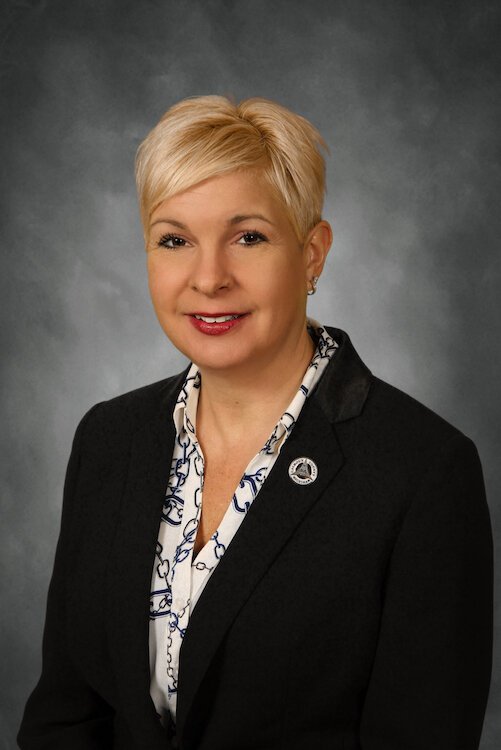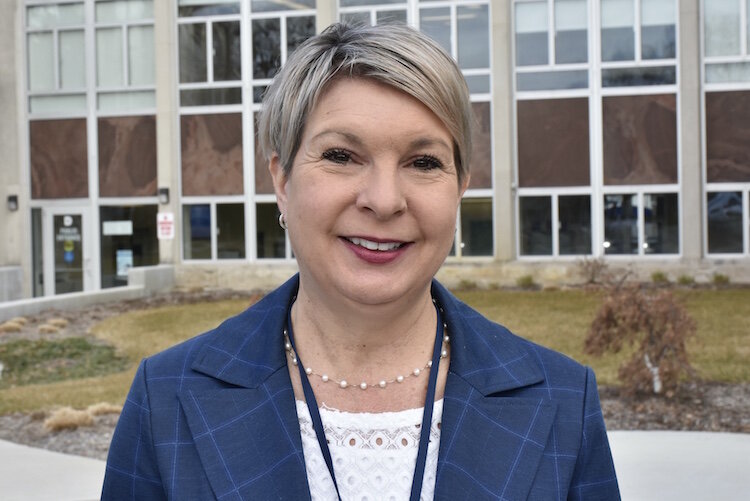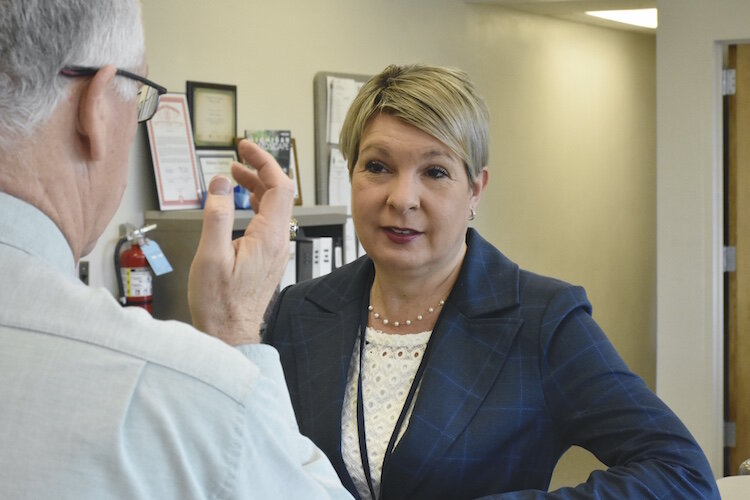Calhoun County Administator Kelli Scott reflects on 2020, looks ahead to 2021
There’s an increased need for human services and a diminished revenue base and putting the two together has the potential to be detrimental to Calhoun County residents. County Administrator Kelli Scott tells us what could lie ahead in 2021. She says in times like these, leadership matters.
Editor’s note: This story is part of Southwest Michigan Second Wave’s On the Ground Calhoun County series.
Since 2009 Kelli Scott has been serving as Calhoun County’s Administrator/Controller. Although she has dealt with many issues and challenges since that time, she says nothing has compared to what she and her staff experienced in 2020. She recently took the time to share her thoughts on what has passed and what lies ahead in 2021 for the county and its residents.
Q.: In one word describe what 2020 was like for you as the County Administrator and the County as a whole?
A.: The one word is resilience and persistence is a close second.
Once we got hit with the pandemic and word of it in February and March everything since that day has presented something new and different and our county government and our leadership has had to figure out on a daily basis how to take care of ourselves and provide services to the public. We were really resilient throughout the year.

A lot of the response efforts at the beginning were really communications-based. We were watching the national and state news and listening to comments from elected officials and our Joint Operations Center teams and adapting every day so that we were addressing needs to keep the public informed. When people don’t know what’s going on, that diminishes their comfort level and level of peace. The guidance changed a lot from the Centers for Disease Control and the state’s Health and Human Services officials and we had to be persistent in saying the right things and being as accurate as we could and being responsive to our community.
The JOC was incredibly helpful and as we understood the needs better of our vulnerable populations and communities at-risk. We expanded our workgroups to include the voice of the business community through the Chambers of Commerce, and faith-based and nonprofit organizations to understand the needs of their members. We met every day at the beginning of the pandemic and said, “How can we get better and maintain stability in this community?”
Q.: What are the residual impacts for the county from 2020?
A.: We know that our residents are still struggling financially, mentally, and physically. Businesses have been trying really hard to survive the pandemic and the economic downturn. Revenues for our municipalities have been decreasing. We have been watching unemployment levels and property values in our community and hope they stabilize. Our courts have a really large backlog of criminal cases and some of those are still continuing. Those impacts at some point will stabilize. Our Health Department and hospitals have continued to have an ongoing response.
I really think it’s a combination of the fact that our residents are still struggling and the financial constraints they are dealing with. It’s a double-edged sword. There’s an increased need for human services and a diminished revenue base and putting the two together has the potential to be detrimental to our residents.
In our own offices, we have been forced to make some changes to do things differently and that will continue. We created policies to enable our employees to work from home and take care of their families. We have employed some technologies that will continue to give our residents more options to engage with local government from home and get business done online or over the phone. The pandemic has forced best practices that have been put in place quicker than they otherwise would have been.
Q.: What are your top three priorities as County Administrator in 2021?
A.: One of my favorite statements is “leadership matters.” My job is to always support the Board of County Commissioners and the county’s employees through a transitional year and this whole year will be transitional because we have new board members and the ongoing fallout from the pandemic.
I also must manage the financial status for the county government and monitor and manage reduced revenues.
I need to communicate and keep the general public informed and adapt to their changing needs.
Q.: What have you identified as the major projects for the County this year?
A.: I have to start with two items that voters spoke to with the August election. We received a new Parks Millage and will be deploying those funds to each of our municipalities to enhance parks with 50 percent of that that will be used to enhance county parks. This includes leveraging some pretty large grants for Kimball Pines Park and to develop a rustic trailhead in Albion.
From our Roads Department, we are close to finishing the Emmett Township local road improvement project which included 75 miles of roadway. This is the second year of a three-year plan that finished ahead of schedule in 2020, despite the pandemic. With the completion of the Emmett Township project in addition to work done a few years ago on roads in Pennfield and Bedford townships, we will have improved greatly almost half of the local county’s roads.
Kind of a theme with us is to continue the expansion of technology options. Our new Public Defender’s Office is working on implementing software for public defenders. This will streamline communications with the courts and prosecutors to make sure that indigent populations get the best service possible. The courts and other elected officials are looking at continuing technology ideas that were in the works before or during this year or as a response to COVID. A lot of us working remotely have had softphones installed on our laptops so that county employees can receive phone calls at home, which makes it seamless for our callers. This will save some hardware costs and eliminate hard phone technology that you typically see on office desks. There will be a big emphasis on continuing to support technology with courts and increase their capability to have virtual hearings. This will enable a lot of services to continue for our courts and their staffs.
The voters also approved the renewal of a Senior Millage. Our Senior Services office has worked hard this year to assess seniors’ needs. They have launched a collaborative initiative, including one called “Grandpads” to keep seniors connected. It’s been very successful and they’ve been able to show some really cool outcomes that lower the amount of times older adults ended up in the Emergency Room or lowered the amounts of depression because this technology has connected them to young people, families, and doctors.
We are looking at ways to increase the ability for our residents to pay for services online. Some offices already have the ability to pay online trying to make it easier. We are looking at ways to bundle these services to minimize fees and make them more consistent. So, a person could apply for a dog license and marriage license at the same time and save money. We convened all elected officials, department officials, and judicial officials and we have been meeting once a week and we’ve grown closer to be able to create more consistent processes across departments. We’re trying to think about services the county provides and streamline those services using technology that’s consistent.
The county obviously is concerned about economic development in our community going forward. We are supporting some pretty big economic development grants with sites in Emmett and Marshall township to make them shovel-ready for development and the county is supporting townships by providing planning and zoning services. In Calhoun County, most local governments provide their own zoning and planning services to their residents and now the county is planning to offer those services as another option.
Q.: What are the challenges facing the County this year? How will they be overcome?
A.: One biggest challenge is the continued need to respond to the pandemic. A lot of us have been required to focus on the pandemic response and departments will have to continue to do that. We have 25 fewer employees on board than we did in 2020. We are continuing to focus on serving vulnerable populations and keeping our finances stable. Through the state’s Health Department, we have received grant funding to increase staffing and capacity.
We will continue to focus on long-term budgeting and aggressively seek grants to offset reduced revenues or projects that were going to be helped with revenues. We’ve closed all of the defined-benefit pension plans and that will address long-term legacy costs. We’ve also engaged a consultant to study the fees that we charge to the public and optional services. So, if you want to get a septic permit from the Health Department that is considered an individual benefit and we will offset the fee for services the county provides. We will be charging individuals an appropriate amount so it doesn’t impact everyone. This involves a study of discretionary fees.
We will be continuing to adapt post-pandemic based on lessons learned and best practices we put in place. We will undertake a Diversity, Equity, and Inclusion initiative training for employees that will better position us to move forward and understand differences in the composition of leaders and staff going forward. This will give us better insight into how we engineer job duties and work with employees and their work schedules. We will encourage remote work where it’s needed so we can attract and retain the best employees and provide better services to the public.
Q.: What types of changes can residents expect to see this year in terms of the way the county will be operating?
A.: They can expect to see a continued increase in options to engage with county government than what they’ve seen in the past. A lot of our offices will require appointments and there are also online options. They should expect in-person interaction for group meetings and other opportunities to engage with communities. We expect virtual hearings with the courts to continue. At some point jury trials will resume and criminal cases will get caught up. For any local business wanting to do business with the county, when we put bids out there, there will be a new streamlined way to get that done. We will continue broadcasting our meetings and voting from the County Commission chambers and there will be more online options where the public can watch our meetings.
We are finishing the multi-year phase of documenting and archiving through an imaging system so that individuals will have better access to public records.
Q.: Will there be staffing cutbacks?
A.: We have 25 fewer staff than we did last year through retirements or resignations. Because of the pandemic and concerns about the budget we left those positions vacant. We did not have to lay people off in 2020. Several of the vacancies were not eliminated, instead we left them unfunded within this current budget. Depending on how operations ramp up and our budget grows, there is some hope to fill those positions. We’ve done a good job with long-term forecasting and contingencies to weather this recession. Out of all of the services we provide, 85 percent are mandated by state statutes.
Q.: What projects were put on hold in 2020 that may happen in 2021?
A.: I would categorize them as consulting-related projects. We have engaged a consultant to study the Prosecutor’s Office and look at staffing levels. That began in 2020 and continues into 2021.
The Land Bank has requested funding be carried over into 2021 because of ongoing rehab and renovation work that was more difficult to do because they couldn’t meet face-to-face with the public. That slowed down their progress and their ability to sell properties
There is a landscaping project at the Justice Center that’s been in the works. We delayed that for a year to limit services and staffing to provide essential services.
Q.: If you have a wish list of what you’d like to see accomplished this year to move the County forward, what would be on that list and why?
A.: I wish for economic stabilization which is best for all of us. Not having clarity about our financial future impacts us in so many ways. I look for success with our new county leadership, which includes Gary Tompkins who is our new Board Vice-Chair, and the continued service of Steve Frisbie as our Board Chair. We will be working with our commissioners on prioritization.
My hope is that all of us continue to work together and provide solid leadership for our community. I hope we end the year with continuing with our new ways of thinking. The mindset has got to be that change is OK and it’s become the new normal.
Q.: How are you prioritizing what really must get done this year?
A.: We have to focus on the health and safety of our residents getting through the pandemic first. The budget always helps to drive our priorities and we will stick with that. Our countywide leadership team meets regularly and they have the pulse on how priorities are changing in the community. My Board Chair and myself meet with leaders of municipalities on a regular basis. We will also look to our local community partners and nonprofits in terms of what’s best to move the county forward.
Q.: What is your message to residents in 2021?
A.: I want to remind them that the county has been with them and here for them throughout 2020. We’ve found ways to service critical needs. Our Health Department has increased its capacity. County leadership is better positioned than ever this year after getting through this pandemic.
We’re here to help residents be resilient and persistent in getting through this year. Residents are seeing county government be even more responsive to their needs.

















